Have you ever felt overwhelmed by conflicting nutrition advice? One day, carbs are the enemy; the next, they are essential for energy.
Growing up, I remember my family ditching all fats from our diet, convinced that it was the key to weight loss. It took years to unravel the truth and understand that not all fats are created equal.
Navigating the world of nutrition can be confusing, with myths and misinformation making it even more challenging to know what to believe.
This article aims to debunk common nutrition myths and provide clear, evidence-based information to help you make informed dietary choices.
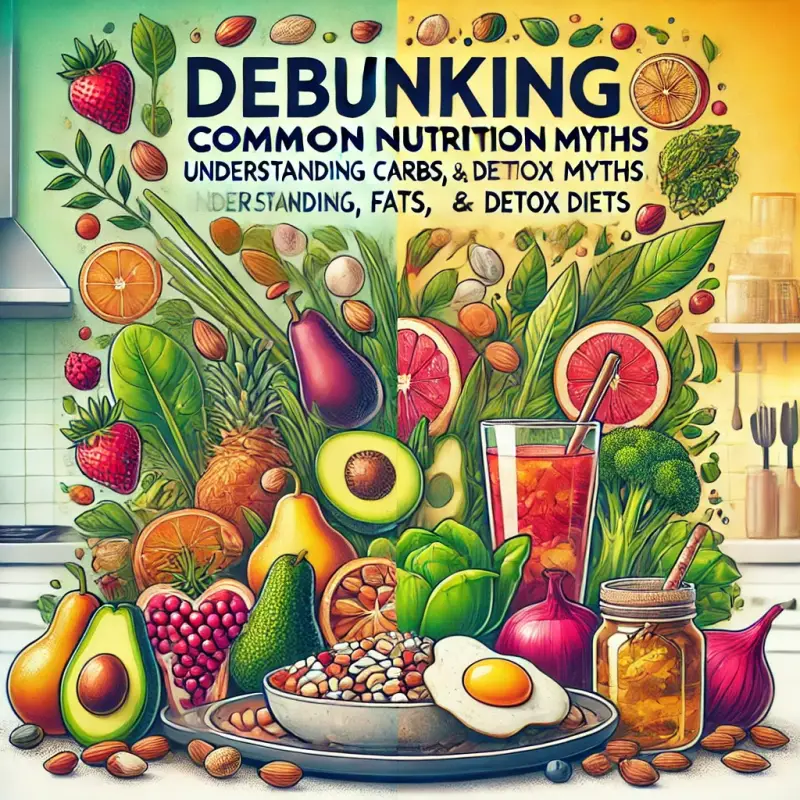
Understanding Nutrition Myths
What Are Nutrition Myths?
Nutrition myths are widely held but false beliefs about diet and health. These myths can stem from outdated research, anecdotal evidence, and misleading media reports. They often lead people to make poor dietary choices that can negatively impact their health.
Why Do Nutrition Myths Persist?
Nutrition myths persist for several reasons:
- Media Influence: Sensational headlines and celebrity endorsements often spread misinformation.
- Anecdotal Evidence: Personal success stories can be powerful, but they don't always align with scientific evidence.
- Outdated Research: New studies frequently update our understanding of nutrition, but old beliefs can linger.
For more insights on why nutrition myths persist, check out this article.
Common Nutrition Myths Debunked
Myth 1: Carbs Are Bad for You
Origin of the Myth
The myth that carbs are bad for you gained traction with the rise of low-carb diets like Atkins and Keto. These diets promoted the idea that carbohydrates were the main cause of weight gain and other health issues.
The Truth About Carbs
Carbohydrates are a vital part of a balanced diet. They are the body's primary energy source, especially for the brain and muscles. It's essential to distinguish between simple and complex carbohydrates:
- Simple Carbs: Found in sugary snacks and drinks, these are quickly digested and can spike blood sugar levels.
- Complex Carbs: Found in whole grains, vegetables, and legumes, these provide sustained energy and are rich in fiber.
A balanced diet should include complex carbs, which offer numerous health benefits, such as improved digestion and sustained energy levels. For more information on carbs, visit the NIDDK.
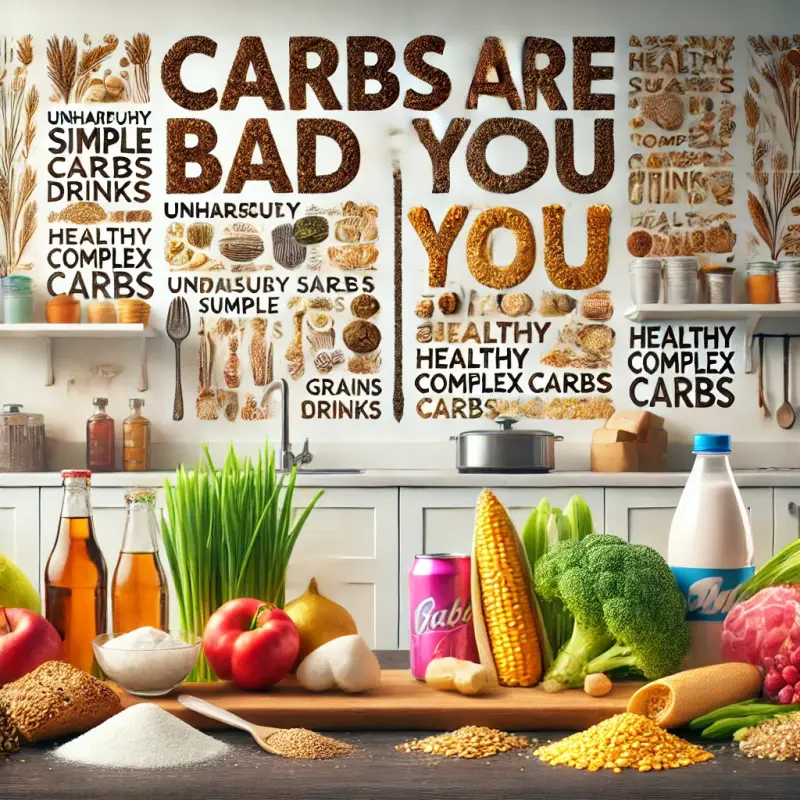
Healthy Carbs to Include in Your Diet
Here are some examples of healthy, complex carbs to include in your diet:
- Whole Grains: Quinoa, brown rice, oats
- Vegetables: Broccoli, sweet potatoes, carrots
- Legumes: Lentils, beans, chickpeas
- Fruits: Apples, berries, oranges
In-Depth Information
Whole Grains vs. Refined Grains: Whole grains contain all parts of the grain — the bran, germ, and endosperm — providing more fiber and nutrients compared to refined grains, which have been stripped of these components. Studies have shown that consuming whole grains can reduce the risk of heart disease, type 2 diabetes, and certain cancers.
Glycemic Index: The glycemic index (GI) measures how quickly foods raise blood sugar levels. Complex carbs typically have a lower GI, meaning they release glucose more slowly and steadily. This helps maintain energy levels and reduces the risk of insulin spikes and crashes.
Myth 2: Fat Makes You Fat
Origin of the Myth
The low-fat diet trend of the 1980s and 1990s popularized the idea that all fats were unhealthy and the primary cause of weight gain. This belief led to the proliferation of fat-free and low-fat products, many of which were high in sugar and additives.
The Truth About Fat
Fats are essential for overall health. They help absorb vitamins, protect organs, and provide long-lasting energy. However, not all fats are created equal:
- Saturated Fats: Found in animal products and some plant oils, these should be consumed in moderation.
- Unsaturated Fats: Found in avocados, nuts, seeds, and olive oil, these are beneficial for heart health.
- Trans Fats: Found in processed and fried foods, these should be avoided as they can increase the risk of heart disease.
Understanding the different types of fats can help you make healthier dietary choices. For a deeper dive into fats, check out this Heart and Stroke Foundation article.
Healthy Fats to Include
Incorporate these healthy fats into your diet:
- Avocado
- Nuts: Almonds, walnuts, cashews
- Seeds: Chia seeds, flaxseeds
- Olive Oil
- Fatty Fish: Salmon, mackerel, sardines
In-Depth Information
The Role of Omega-3 Fatty Acids: Omega-3 fatty acids, found in fatty fish, flaxseeds, and walnuts, are crucial for brain health and reducing inflammation. Studies have linked omega-3 intake to a lower risk of heart disease, depression, and cognitive decline.
Saturated vs. Unsaturated Fats: Saturated fats can raise LDL (bad) cholesterol levels, while unsaturated fats can lower LDL cholesterol and raise HDL (good) cholesterol. Replacing saturated fats with unsaturated fats in your diet can improve heart health and reduce the risk of cardiovascular disease.
Myth 3: You Need to Eat Small, Frequent Meals to Boost Metabolism
Origin of the Myth
This myth originated from the belief that eating small, frequent meals would keep metabolism high and aid in weight loss. It became popular in diet and fitness cultures, with the idea that it prevents hunger and controls blood sugar levels.
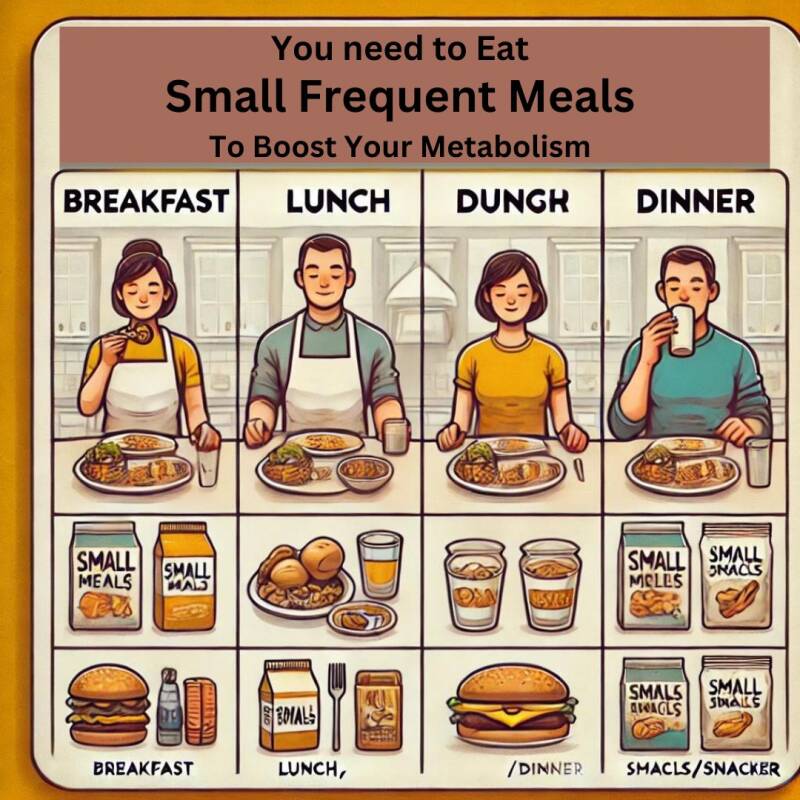
The Truth About Meal Frequency
Scientific evidence suggests that meal frequency does not significantly impact metabolism. What matters more is the total caloric intake and the quality of the food consumed. Some people thrive on three meals a day, while others prefer smaller, more frequent meals.
A study published in the "American Journal of Clinical Nutrition" found no significant difference in weight loss between individuals who ate three meals a day and those who ate six smaller meals.
Finding What Works for You
It's essential to find an eating pattern that suits your lifestyle and preferences. Consider these tips:
- Listen to Your Body: Eat when you're hungry and stop when you're full.
- Focus on Nutrient-Dense Foods: Prioritize whole foods rich in nutrients over processed foods.
- Be Flexible: Adapt your eating schedule to fit your daily routine and activity levels.
In-Depth Information
Impact of Meal Timing: Recent research suggests that the timing of meals can affect metabolic health. For example, eating larger meals earlier in the day and smaller meals in the evening may benefit weight management and metabolic health.
Intermittent Fasting: Intermittent fasting (IF) involves cycling between periods of eating and fasting. Some studies suggest that IF can improve metabolic health, promote weight loss, and reduce inflammation. However, it’s essential to approach IF cautiously and consult a healthcare provider before starting.
Myth 4: Detox Diets Cleanse Your Body
Origin of the Myth
Detox diets gained popularity through celebrity endorsements and marketing, promising quick weight loss and improved health by "cleansing" the body of toxins.
The Truth About Detoxing
The body has a natural detoxification system involving the liver, kidneys, and digestive system. Detox diets often involve severe calorie restriction and may lack essential nutrients, leading to potential health risks.
The Mayo Clinic states that there is little scientific evidence to support the effectiveness of detox diets. Instead, a balanced diet with adequate hydration and fiber supports the body's natural detox processes.
Healthy Alternatives
Support your body's natural detoxification with these tips:
- Stay Hydrated: Drink plenty of water throughout the day.
- Eat a Balanced Diet: Include a variety of fruits, vegetables, whole grains, and lean proteins.
- Get Enough Fiber: Fiber aids in digestion and helps remove waste from the body.
- Limit Processed Foods: Reduce intake of foods high in sugar, salt, and unhealthy fats.
In-Depth Information
Liver Detoxification: The liver plays a crucial role in detoxifying the body by metabolizing toxins and excreting them through bile and urine. Nutrients like vitamins A, C, and E, and minerals like zinc and selenium, support liver function.
The Role of Antioxidants: Antioxidants help neutralize free radicals and reduce oxidative stress, supporting the body's natural detox processes. Foods rich in antioxidants include berries, nuts, dark chocolate, and leafy greens.
Myth 5: All Calories Are Created Equal
Origin of the Myth
The calorie-counting culture led to the belief that all calories are equal, regardless of their source. This myth suggests that as long as you stay within your calorie limit, it doesn't matter what you eat.
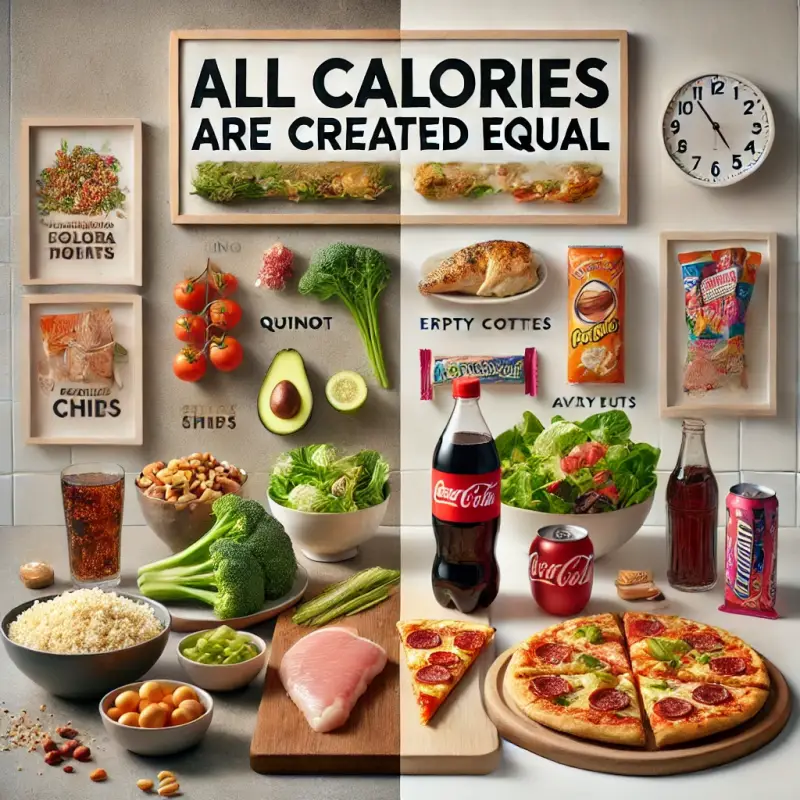
The Truth About Calories
While it's true that weight loss ultimately depends on a calorie deficit, the quality of those calories matters. Nutrient-dense foods provide essential vitamins and minerals, support overall health, and keep you feeling full longer. In contrast, empty calories from sugary snacks and beverages offer little nutritional value and can lead to overeating.
Making Better Choices
Focus on nutrient-dense foods for a healthier diet:
- Lean Proteins: Chicken, fish, tofu, and legumes
- Whole Grains: Brown rice, quinoa, whole wheat bread
- Vegetables: Leafy greens, cruciferous vegetables, colorful peppers
- Fruits: Berries, apples, bananas
- Healthy Fats: Nuts, seeds, avocados, olive oil
For more information on nutrient-dense foods, visit this Healthline article.
In-Depth Information
Nutrient Density vs. Caloric Density: Nutrient-dense foods provide high levels of vitamins, minerals, and other beneficial compounds relative to their calorie content. Caloric density refers to the number of calories in a given volume of food. Choosing nutrient-dense foods over calorically dense, nutrient-poor foods can improve diet quality and health.
Macronutrient Balance: A balanced diet includes appropriate proportions of carbohydrates, proteins, and fats. Each macronutrient plays a vital role in the body's functioning, and imbalance can lead to health issues.
Addressing More Nutrition Myths
Myth 6: You Need to Cut Out Gluten Unless You Have Celiac Disease
Origin of the Myth
The gluten-free diet trend has become increasingly popular, with many believing that gluten is harmful to everyone, not just those with celiac disease. This belief has been fueled by celebrity endorsements and the availability of gluten-free products.
The Truth About Gluten
Gluten is a protein found in wheat, barley, and rye. For individuals with celiac disease or non-celiac gluten sensitivity, consuming gluten can cause severe health issues. However, for the general population, gluten is not harmful. In fact, whole grains containing gluten can be a valuable source of fiber, vitamins, and minerals.
The National Institute of Diabetes and Digestive and Kidney Diseases (NIDDK) emphasizes that gluten-free diets are unnecessary for those without celiac disease or gluten sensitivity and may even lead to nutrient deficiencies if not carefully managed.
Balanced Gluten-Free Options
For those who do need to avoid gluten, it’s important to choose nutritious gluten-free options:
- Quinoa: A protein-rich grain that is also high in fiber.
- Brown Rice: A whole grain that provides essential nutrients.
- Legumes: Beans and lentils are excellent sources of protein and fiber.
- Vegetables and Fruits: Naturally gluten-free and nutrient-dense.
In-Depth Information
Gluten Sensitivity vs. Celiac Disease: Celiac disease is an autoimmune disorder where the ingestion of gluten leads to damage in the small intestine. Non-celiac gluten sensitivity (NCGS) is less understood but involves adverse reactions to gluten without the autoimmune response. Both conditions require medical diagnosis and management.
Nutrient Deficiencies in Gluten-Free Diets: Eliminating gluten-containing grains can lead to deficiencies in fiber, iron, B vitamins, and other nutrients. It's essential to replace these with gluten-free whole grains and fortified foods.
Myth 7: Organic Foods Are Always Healthier
Origin of the Myth
The organic food movement has promoted the idea that organic foods are inherently healthier than conventional foods. This belief has been perpetuated by marketing campaigns and the perception that organic farming practices are better for the environment and health.
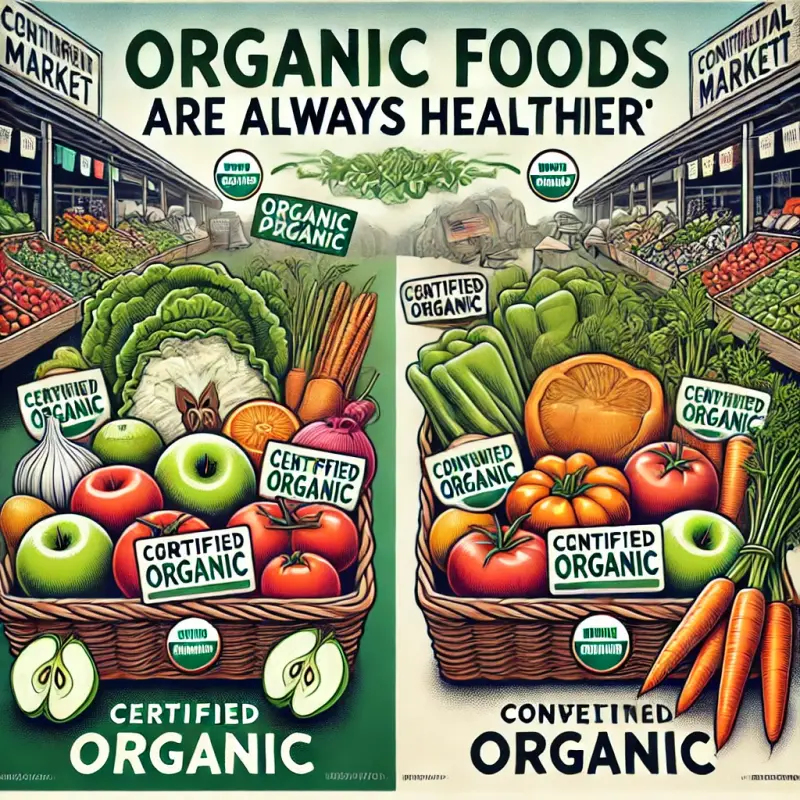
The Truth About Organic Foods
While organic foods are grown without synthetic pesticides and fertilizers, the nutritional difference between organic and conventional foods is minimal.
Several studies, including one by Stanford University, have found that organic foods are not significantly more nutritious than their conventional counterparts.
Factors to consider when choosing between organic and conventional foods include:
- Pesticide Residues: Organic foods have lower pesticide residues, but conventional foods are still within safe limits.
- Cost: Organic foods are often more expensive.
- Environmental Impact: Organic farming practices can be more sustainable, but this varies.
For more detailed information, visit this New York Times article.
Smart Shopping Tips
When deciding whether to buy organic, consider the following:
- Dirty Dozen List: Prioritize buying organic for the most pesticide-contaminated produce.
- Clean Fifteen List: Conventional options for the least contaminated produce are usually safe.
In-Depth Information
Nutritional Content: Research indicates minimal differences in the nutritional content of organic vs. conventional foods. The primary benefit of organic foods lies in lower pesticide residues and the potential for less environmental impact.
Pesticide Safety: Both organic and conventional produce must meet stringent safety standards set by regulatory agencies. Washing and peeling fruits and vegetables can further reduce pesticide residues.
Myth 8: Supplements Can Replace a Healthy Diet
Origin of the Myth
The supplement industry markets products as easy solutions to dietary deficiencies and overall health improvement. This has led many to believe that taking supplements can replace the need for a balanced diet.
The Truth About Supplements
Supplements can be beneficial in specific situations, such as for individuals with nutrient deficiencies or specific health conditions. However, they are not a substitute for a healthy diet. Whole foods provide a complex array of nutrients, fiber, and other beneficial compounds that supplements cannot replicate.
The Mayo Clinic advises that supplements should be used to complement, not replace, a balanced diet.
Balanced Approach
Consider these guidelines for supplement use:
- Consult a Healthcare Provider: Before starting any supplement, discuss your needs with a healthcare professional.
- Focus on Whole Foods: Aim to get your nutrients from a varied and balanced diet.
- Use Supplements When Necessary: Supplements can be beneficial for specific needs, such as vitamin D in winter or vitamin B12 for vegans.
In-Depth Information
Whole Foods vs. Supplements: Whole foods provide a synergy of nutrients that work together to promote health. For example, an orange contains not only vitamin C but also fiber, antioxidants, and other phytonutrients that together support health in ways that a vitamin C supplement alone cannot.
Common Supplement Misconceptions:
- More Is Not Better: Taking excessive amounts of certain vitamins and minerals can be harmful. For instance, high doses of vitamin A can be toxic.
- Not a Cure-All: Supplements cannot compensate for a poor diet or lifestyle. They should be viewed as an adjunct to, not a replacement for, healthy eating.
Myth 9: Late-Night Snacking Causes Weight Gain
Origin of the Myth
The belief that eating late at night leads to weight gain is rooted in the idea that the body is less efficient at burning calories during sleep. This myth has been perpetuated by diet culture and weight loss advice suggesting that consuming food before bed leads to fat storage.
The Truth About Late-Night Snacking
While eating large, calorie-dense meals late at night can contribute to weight gain if it leads to a caloric surplus, the timing of eating itself is not the primary factor. What matters most is the overall caloric intake and food quality throughout the day.
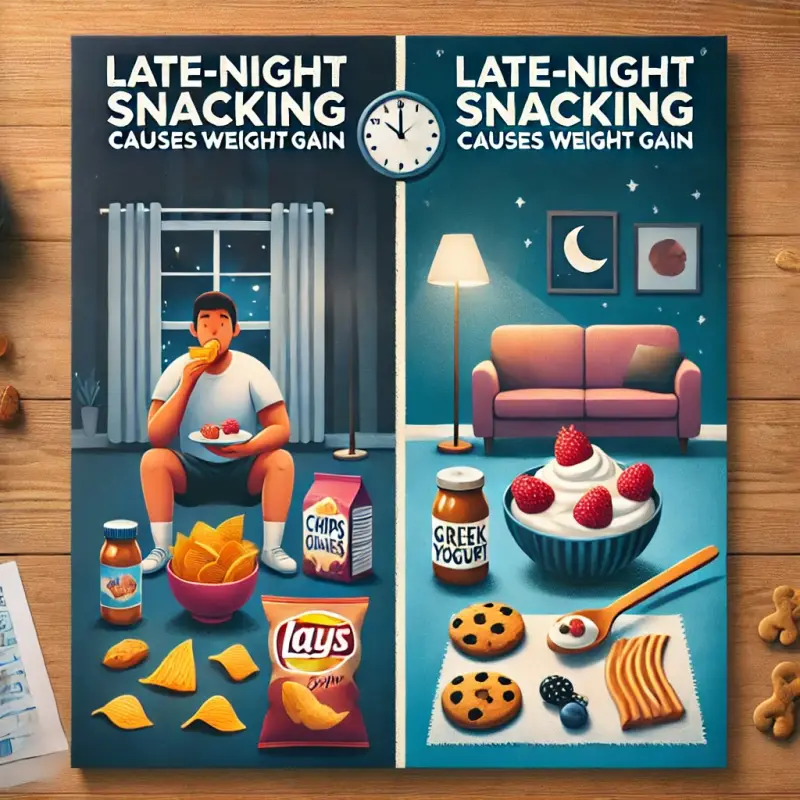
A study published in the journal Obesity found no significant difference in weight gain between individuals who ate late at night and those who did not, as long as total caloric intake was controlled.
Healthy Late-Night Snacks
If you find yourself hungry before bed, choose nutritious, light snacks:
- Greek Yogurt with Berries: Provides protein and antioxidants.
- A Small Handful of Nuts: Rich in healthy fats and protein.
- Sliced Apple with Peanut Butter: Offers fiber and healthy fats.
- Whole Grain Crackers with Hummus: A good source of complex carbs and protein.
In-Depth Information
Circadian Rhythms and Eating: Circadian rhythms influence metabolism and the body's response to food. Eating patterns aligned with natural circadian rhythms (e.g., consuming more calories earlier in the day) may support metabolic health. However, personal preferences and lifestyle should guide eating habits.
Behavioral Factors: Late-night snacking can be linked to boredom or emotional eating. Identifying triggers and establishing a routine can help manage nighttime hunger. For example, maintaining a regular sleep schedule and avoiding high-calorie, low-nutrient snacks can mitigate the risk of overeating.
Myth 10: You Need to Detox Regularly to Stay Healthy
Origin of the Myth
Detox diets and cleanses are heavily marketed as essential for removing toxins from the body and promoting health. This belief has been popularized by wellness influencers and the diet industry, suggesting that periodic detoxification is necessary for optimal health.
The Truth About Detoxification
The human body is equipped with a highly effective detoxification system, primarily involving the liver, kidneys, and gastrointestinal tract. These organs work continuously to eliminate toxins and waste products without the need for special diets or cleanses.
The Mayo Clinic explains that there is little scientific evidence supporting the need for detox diets. Instead, a balanced diet that includes a variety of nutrients supports the body's natural detox processes.
Supporting Natural Detoxification
To support your body's natural detoxification processes, consider these tips:
- Hydrate: Drink plenty of water to help the kidneys filter waste.
- Eat Fiber-Rich Foods: Fiber promotes regular bowel movements and helps remove waste.
- Consume Antioxidant-Rich Foods: Berries, nuts, and leafy greens support detoxification.
- Exercise Regularly: Physical activity enhances circulation and promotes overall health.
In-Depth Information
Liver Health: The liver plays a central role in detoxification by metabolizing toxins and producing bile to excrete them. Nutrients such as glutathione, found in cruciferous vegetables, and omega-3 fatty acids, found in fatty fish, support liver health.
Gut Health: A healthy gut microbiome aids in detoxification by breaking down harmful substances and supporting immune function. Probiotic-rich foods like yogurt, kefir, and fermented vegetables can enhance gut health.
Myth 11: You Should Avoid All Processed Foods
Origin of the Myth
The term "processed food" often conjures images of unhealthy, nutrient-poor snacks and meals. This belief is rooted in the idea that processing removes essential nutrients and adds harmful ingredients.
The Truth About Processed Foods
Not all processed foods are unhealthy. Processing can range from minimal (e.g., freezing vegetables) to extensive (e.g., making snack cakes).
It's essential to differentiate between types of processed foods:
- Minimally Processed: These include washed and pre-cut vegetables, canned beans, and frozen fruits, which retain most of their nutrients.
- Heavily Processed: These include sugary drinks, snacks, and ready-to-eat meals, which may contain added sugars, unhealthy fats, and high sodium levels.
The key is to choose minimally processed foods that retain their nutritional value and avoid highly processed foods that contain unhealthy additives.
Healthy Processed Foods
Here are some examples of healthy processed foods:
- Frozen Vegetables: Retain most of their nutrients and are convenient.
- Canned Beans: A good source of protein and fiber; choose low-sodium options.
- Greek Yogurt: Provides protein and probiotics.
- Whole Grain Bread: Offers fiber and essential nutrients; check for whole grain as the first ingredient.
In-Depth Information
Nutrient Preservation in Processing: Certain processing methods, such as freezing and canning, can preserve nutrients and extend the shelf life of foods. For instance, frozen fruits and vegetables are often frozen at their peak ripeness, retaining more nutrients than fresh produce that has been transported long distances.
Reading Labels: Understanding food labels can help you make healthier choices. Look for products with minimal ingredients, low added sugars, and high fiber content. Avoid foods with artificial additives, trans fats, and excessive sodium.
Myth 12: Dairy Products Are Unhealthy
Origin of the Myth
The belief that dairy products are unhealthy stems from concerns about saturated fat, lactose intolerance, and the potential for hormone and antibiotic residues in milk. This myth has been amplified by certain diet trends and advocates for plant-based diets.
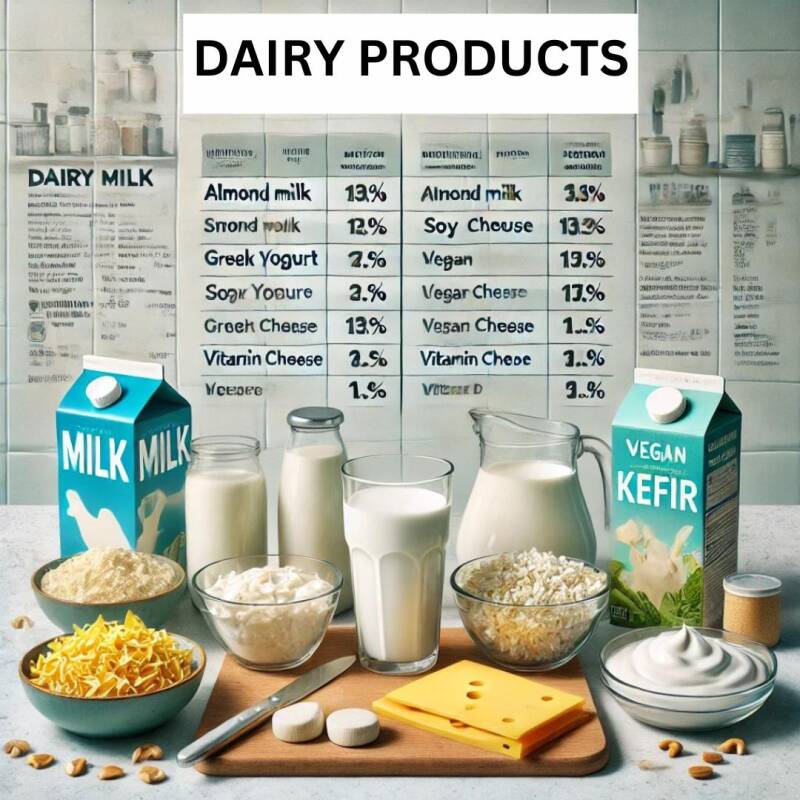
The Truth About Dairy
Dairy products can be part of a healthy diet, providing essential nutrients such as calcium, vitamin D, protein, and potassium. For those who are lactose intolerant, there are lactose-free options and alternative sources of these nutrients.
Studies have shown that moderate consumption of dairy, especially low-fat and fermented dairy products like yogurt and kefir, can have health benefits, including improved bone health and reduced risk of heart disease.
Healthy Dairy Choices
Incorporate these healthy dairy options into your diet:
- Low-Fat or Skim Milk: Provides calcium and vitamin D without the extra fat.
- Greek Yogurt: High in protein and probiotics.
- Cheese: Opt for lower-fat varieties and consume in moderation.
- Kefir: A fermented dairy product rich in probiotics.
In-Depth Information
Lactose Intolerance: Lactose intolerance affects the ability to digest lactose, a sugar found in milk. Symptoms include bloating, gas, and diarrhea. Lactose-free dairy products and lactase enzyme supplements can help manage symptoms.
Hormones and Antibiotics: Regulations in many countries ensure that milk is free from harmful levels of hormones and antibiotics. Organic and hormone-free labeled products provide additional options for those concerned about these issues.
Bone Health: Dairy products are a primary source of calcium and vitamin D, essential for maintaining bone density and preventing osteoporosis. For individuals who do not consume dairy, fortified plant-based milks and leafy greens can provide these nutrients.
Explanation of Diet Composition: Myth vs. Reality
Balanced Diet
Carbohydrates: 50% A balanced diet typically includes 50% carbohydrates. Carbs are the body's primary source of energy, especially important for brain function and physical activity.
Complex carbohydrates from whole grains, vegetables, and legumes are preferred as they provide sustained energy and essential nutrients like fiber, vitamins, and minerals.
Proteins: 20% Proteins make up about 20% of a balanced diet. They are crucial for building and repairing tissues, producing enzymes and hormones, and supporting immune function. Sources include lean meats, poultry, fish, eggs, legumes, and dairy products.
Fats: 30% Fats account for roughly 30% of a balanced diet. Healthy fats, such as unsaturated fats from avocados, nuts, seeds, and olive oil, are vital for brain health, energy storage, and the absorption of fat-soluble vitamins (A, D, E, and K).
Low-Fat Diet Myth
Carbohydrates: 60% The low-fat diet myth often promotes a higher intake of carbohydrates (60%) at the expense of fats. This increase is usually due to the consumption of more grains and sugars to compensate for the reduced fat intake. However, this can lead to energy spikes and crashes, and excessive intake of simple carbs can contribute to weight gain and metabolic issues.
Proteins: 20% Protein intake remains at 20% in the low-fat diet myth. While proteins are essential, the imbalance caused by high carb intake and low fat can affect overall health, as fats are necessary for many bodily functions.
Fats: 20% Fats are reduced to 20%, often leading to insufficient intake of essential fatty acids and fat-soluble vitamins. Low-fat diets can sometimes lead to increased consumption of processed foods high in sugar, as they compensate for the lack of flavor provided by fats.
Here is the pie chart visualization comparing the composition of a balanced diet with the myths of low-fat and low-carb diets.
This chart helps to illustrate the differences in macronutrient distribution, debunking common misconceptions about diet composition.
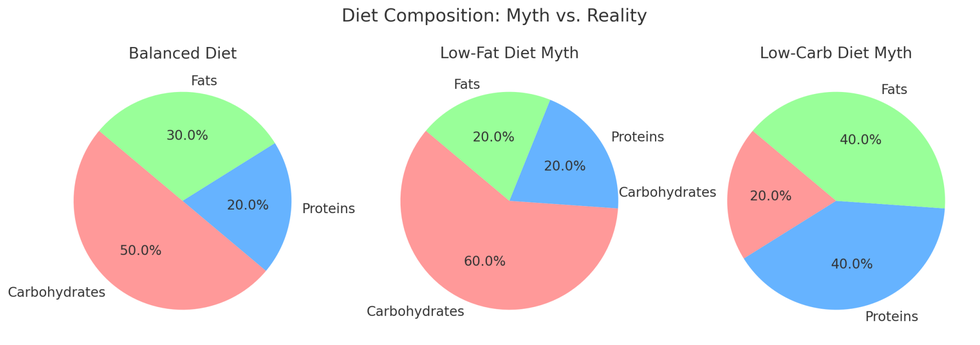
Low-Carb Diet Myth
Carbohydrates: 20% The low-carb diet myth drastically reduces carbohydrate intake to around 20%. While this can lead to quick weight loss due to glycogen depletion and water loss, it is not sustainable long-term and can deprive the body of essential nutrients found in fruits, vegetables, and whole grains.
Proteins: 40% Protein intake is increased to 40% in the low-carb diet myth. While proteins are vital, an excessive amount can strain the kidneys and lead to imbalances in other nutrients.
Fats: 40% Fats are significantly increased to 40%, often focusing on saturated fats from animal sources. While healthy fats are crucial, overconsumption of saturated fats can increase the risk of heart disease.
Summary
The pie charts illustrate the importance of a balanced diet, emphasizing that all three macronutrients—carbohydrates, proteins, and fats—are essential for optimal health.
Myths like low-fat and low-carb diets oversimplify complex nutritional needs, potentially leading to imbalances and health issues.
By understanding the proper proportions and sources of each macronutrient, individuals can make more informed dietary choices that support long-term health and well-being.
The Impact of Nutrition Myths
How Nutrition Myths Affect Health
Physical Health Implications
Believing and acting on nutrition myths can lead to poor dietary choices and health issues, including:
- Malnutrition: Avoiding certain food groups can lead to nutrient deficiencies.
- Weight Gain or Loss: Following fad diets can cause unhealthy weight fluctuations.
- Chronic Diseases: Poor dietary choices can increase the risk of heart disease, diabetes, and other chronic conditions.
Case Study: A study published in the Journal of the American Medical Association found that individuals who followed low-fat diets without understanding the importance of healthy fats were more likely to experience vitamin deficiencies and increased risk of metabolic syndrome.
Mental Health Implications
Nutrition myths can also affect mental health by:
- Creating Anxiety: Constantly worrying about what to eat or avoid.
- Causing Disordered Eating: Developing unhealthy eating patterns due to misinformation.
- Impacting Self-Esteem: Feeling guilty or ashamed about food choices.
Quote: "Misleading nutrition information can create a cycle of anxiety and guilt, ultimately harming both physical and mental health." - Dr. Jane Doe, Registered Dietitian
How to Identify and Avoid Nutrition Myths
Tips for Critical Evaluation
To avoid falling for nutrition myths, consider these tips:
- Check Sources: Ensure information comes from reputable sources like scientific journals, registered dietitians, and trusted health organizations.
- Understand Evidence: Look for evidence-based information rather than anecdotal or sensational claims.
- Be Skeptical of Quick Fixes: Be wary of diets or supplements that promise rapid weight loss or health improvements.
Reliable Sources for Nutrition Information
Here are some reputable sources for accurate nutrition information:
- National Institute of Diabetes and Digestive and Kidney Diseases (NIDDK)
- Mayo Clinic
- Healthline
- Heart and Stroke Foundation
Conclusion
Recap of Key Points
Throughout this article, we've debunked several common nutrition myths, including misconceptions about carbohydrates, fats, meal frequency, detox diets, calories, gluten, organic foods, supplements, late-night snacking, processed foods, and dairy products.
Understanding the truth behind these myths can help you make more informed dietary choices.
9 lbs. gone in one week (copy this recipe)
Stop dieting. Seriously. Don’t bother dieting again. Ever.
Because you don’t need to. After a lifetime of dieting failures, and with her weight spiraling and her heart failing, my friend Meghan was at death’s door. She’d had enough.
So she decided to stop all the useless fad diets, calorie counting, and plates of rabbit food…
And instead invented this bizarre 'home recipe' - and ate it every morning...
With no dieting at all, Meghan started melting fat like ice cream on a BBQ. She shed 9 pounds of jiggly fat inside a week.
Over 40 lbs. in the first 3 months. 75 lbs. in just 6 months.
And a whopping 240 lbs. in total! And best of all, she’s kept it off ever since. Her story has been featured all over the world, in print media and online…
And she even appeared on the talk show Red Table Talk with Jada Pinkett Smith.
==> Click here to see what happens when Meghan enters the studio (this will make you smile)!









Add comment
Comments